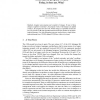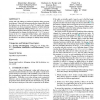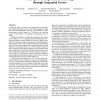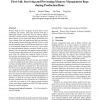180 search results - page 10 / 36 » Locating causes of program failures |
116
click to vote
ESEC
1999
Springer
15 years 7 months ago
1999
Springer
Imagine some program and a number of changes. If none of these changes is applied (“yesterday”), the program works. If all changes are applied (“today”), the program does n...
103
Voted
ISSTA
2000
ACM
15 years 7 months ago
2000
ACM
Given some test case, a program fails. Which part of the test case is responsible for the particular failure? We show how our delta debugging algorithm generalizes and simplifies...
125
Voted
SIGSOFT
2006
ACM
16 years 3 months ago
2006
ACM
Testing and code editing are interleaved activities during program development. When tests fail unexpectedly, the changes that caused the failure(s) are not always easy to find. W...
157
Voted
ASPLOS
2011
ACM
14 years 6 months ago
2011
ACM
Concurrency bugs are caused by non-deterministic interleavings between shared memory accesses. Their effects propagate through data and control dependences until they cause softwa...
103
Voted
EUROSYS
2009
ACM
15 years 12 months ago
2009
ACM
Memory bugs in C/C++ programs severely affect system availability and security. This paper presents First-Aid, a lightweight runtime system that survives software failures caused ...




